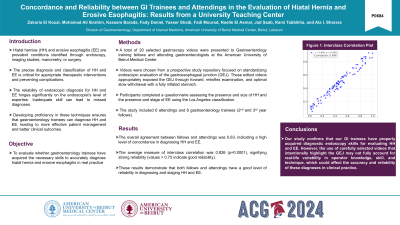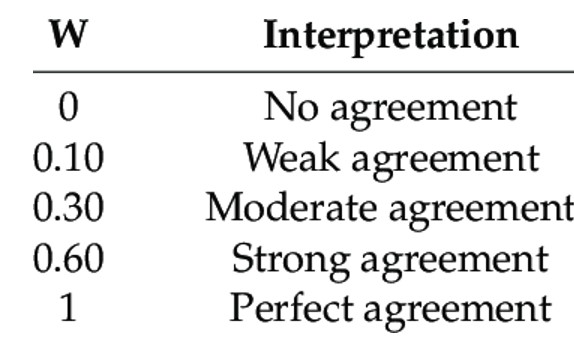Sunday Poster Session
Category: General Endoscopy
P0684 - Concordance and Reliability Between GI Trainees and Attendings in the Evaluation of Hiatal Hernia and Erosive Esophagitis: Results From a University Teaching Center
Sunday, October 27, 2024
3:30 PM - 7:00 PM ET
Location: Exhibit Hall E

Has Audio
- AS
Ala I. Sharara, MD, FACG
American University of Beirut
Beyrouth, Beyrouth, Lebanon
Presenting Author(s)
Zakaria El Kouzi, MD1, Mohamad Ali Ibrahim, MD2, Kassem Barada, MD2, Fady Daniel, MD1, Yasser Shaib, MD2, Fadi Mourad, MD2, Noelle El Asmar, MD2, Rami Tabbikha, MD2, Ala I. Sharara, MD, FACG1
1American University of Beirut, Beyrouth, Beyrouth, Lebanon; 2American University of Beirut, Beirut, Beyrouth, Lebanon
Introduction: Hiatal hernias (HH) are typically diagnosed by endoscopy, imaging studies, manometry, or surgery. The accuracy of endoscopic diagnosis of HH and erosive esophagitis (EE) is significantly influenced by the operator's experience and training, highlighting the importance of skill in identifying this condition.
Methods: A total of 20 videos captured during gastroscopy were introduced to the gastroenterology training fellows and the gastroenterologist attendings of American University of Beirut Medical Center. All the videos were selected from a video repository collected as part of a prospective study on standardization of endoscopic evaluation of the gastroesophageal junction (GEJ). The selected videos were deemed appropriate in exposing the GEJ on forward and retroflex examination, as well as optimal slow withdrawal examination with a fully inflated stomach. The questionnaire collected data about the presence and size of HH, the presence and stage of EE using the Los Angeles classification. Concordance and reliability of diagnosis between gastroenterology trainees and senior attendings was evaluated using Kendall tau and inter-rater reliability correlation respectively.
Results: The assessment was done by 6 attendings and 6 gastroenterology trainees (only 2nd and 3rd year fellows included). Attendings had a mean of 26.8 ± 10 years of experience while the fellows only had a mean of 2 ± 0.9 years of experience. The overall agreement between fellows and attendings was 0.63. This indicates that there was high agreement in the diagnosis of HH and EE. Upon evaluation of interclass correlation, the average measure was 0.826 which is greater than 0.75 with a p=0.0001. These results showed good reliability of the fellows and the attendings to diagnose and rate the presence of HH and severity of EE.
Discussion: The results of this study confirm the proper acquisition of relevant diagnostic endoscopy skills by GI trainees in the evaluation of HH and EE. It is noteworthy, however, that the edited videos were intentionally selected to highlight the area under examination (GEJ), and it is conceivable that real-life variability in operator knowledge, skill and technique, could negatively impact the agreement and reliability of HH and EE diagnosis in clinical practice.

Note: The table for this abstract can be viewed in the ePoster Gallery section of the ACG 2024 ePoster Site or in The American Journal of Gastroenterology's abstract supplement issue, both of which will be available starting October 27, 2024.
Disclosures:
Zakaria El Kouzi, MD1, Mohamad Ali Ibrahim, MD2, Kassem Barada, MD2, Fady Daniel, MD1, Yasser Shaib, MD2, Fadi Mourad, MD2, Noelle El Asmar, MD2, Rami Tabbikha, MD2, Ala I. Sharara, MD, FACG1. P0684 - Concordance and Reliability Between GI Trainees and Attendings in the Evaluation of Hiatal Hernia and Erosive Esophagitis: Results From a University Teaching Center, ACG 2024 Annual Scientific Meeting Abstracts. Philadelphia, PA: American College of Gastroenterology.
1American University of Beirut, Beyrouth, Beyrouth, Lebanon; 2American University of Beirut, Beirut, Beyrouth, Lebanon
Introduction: Hiatal hernias (HH) are typically diagnosed by endoscopy, imaging studies, manometry, or surgery. The accuracy of endoscopic diagnosis of HH and erosive esophagitis (EE) is significantly influenced by the operator's experience and training, highlighting the importance of skill in identifying this condition.
Methods: A total of 20 videos captured during gastroscopy were introduced to the gastroenterology training fellows and the gastroenterologist attendings of American University of Beirut Medical Center. All the videos were selected from a video repository collected as part of a prospective study on standardization of endoscopic evaluation of the gastroesophageal junction (GEJ). The selected videos were deemed appropriate in exposing the GEJ on forward and retroflex examination, as well as optimal slow withdrawal examination with a fully inflated stomach. The questionnaire collected data about the presence and size of HH, the presence and stage of EE using the Los Angeles classification. Concordance and reliability of diagnosis between gastroenterology trainees and senior attendings was evaluated using Kendall tau and inter-rater reliability correlation respectively.
Results: The assessment was done by 6 attendings and 6 gastroenterology trainees (only 2nd and 3rd year fellows included). Attendings had a mean of 26.8 ± 10 years of experience while the fellows only had a mean of 2 ± 0.9 years of experience. The overall agreement between fellows and attendings was 0.63. This indicates that there was high agreement in the diagnosis of HH and EE. Upon evaluation of interclass correlation, the average measure was 0.826 which is greater than 0.75 with a p=0.0001. These results showed good reliability of the fellows and the attendings to diagnose and rate the presence of HH and severity of EE.
Discussion: The results of this study confirm the proper acquisition of relevant diagnostic endoscopy skills by GI trainees in the evaluation of HH and EE. It is noteworthy, however, that the edited videos were intentionally selected to highlight the area under examination (GEJ), and it is conceivable that real-life variability in operator knowledge, skill and technique, could negatively impact the agreement and reliability of HH and EE diagnosis in clinical practice.

Figure: Kendall's W concordance degree scale
Note: The table for this abstract can be viewed in the ePoster Gallery section of the ACG 2024 ePoster Site or in The American Journal of Gastroenterology's abstract supplement issue, both of which will be available starting October 27, 2024.
Disclosures:
Zakaria El Kouzi indicated no relevant financial relationships.
Mohamad Ali Ibrahim indicated no relevant financial relationships.
Kassem Barada indicated no relevant financial relationships.
Fady Daniel indicated no relevant financial relationships.
Yasser Shaib indicated no relevant financial relationships.
Fadi Mourad indicated no relevant financial relationships.
Noelle El Asmar indicated no relevant financial relationships.
Rami Tabbikha indicated no relevant financial relationships.
Ala Sharara indicated no relevant financial relationships.
Zakaria El Kouzi, MD1, Mohamad Ali Ibrahim, MD2, Kassem Barada, MD2, Fady Daniel, MD1, Yasser Shaib, MD2, Fadi Mourad, MD2, Noelle El Asmar, MD2, Rami Tabbikha, MD2, Ala I. Sharara, MD, FACG1. P0684 - Concordance and Reliability Between GI Trainees and Attendings in the Evaluation of Hiatal Hernia and Erosive Esophagitis: Results From a University Teaching Center, ACG 2024 Annual Scientific Meeting Abstracts. Philadelphia, PA: American College of Gastroenterology.
